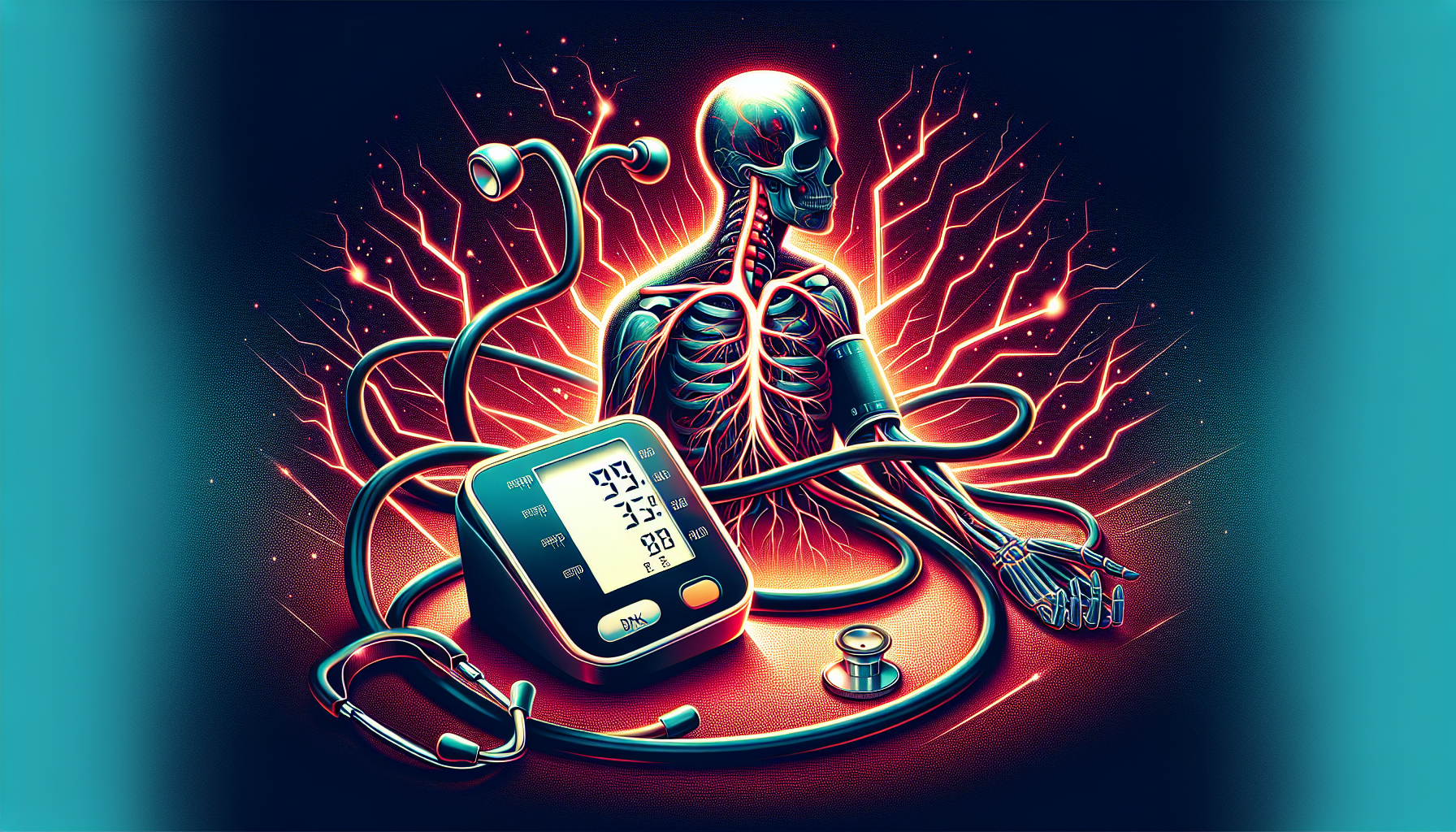High blood pressure, also known as hypertension, is a common condition that affects millions of people worldwide. But did you know that this seemingly harmless condition can actually lead to serious health issues such as stroke or heart disease? Recent scientific studies have shed light on the link between high blood pressure and these potentially life-threatening conditions. For instance, a study conducted by researchers at the University of California found that individuals with high blood pressure have a significantly higher risk of developing both stroke and heart disease compared to those with normal blood pressure levels (Reference: American Heart Association, “High Blood Pressure and Stroke”). These findings highlight the importance of managing and treating high blood pressure to safeguard your heart health and reduce the risk of devastating complications.
Discover the Ultimate Weight Loss Secrets Here!
What is high blood pressure?
High blood pressure, also known as hypertension, is a medical condition characterized by the force of blood against the walls of your arteries being consistently too high. It is often referred to as the “silent killer” because it typically does not cause symptoms, but if left untreated, it can significantly increase your risk of developing serious health problems such as stroke and heart disease.
Definition of high blood pressure
High blood pressure is defined by the American Heart Association as having a systolic blood pressure of 130 mm Hg or higher and/or a diastolic blood pressure of 80 mm Hg or higher. Systolic blood pressure measures the pressure in your arteries when your heart beats, while diastolic blood pressure measures the pressure in your arteries when your heart is at rest between beats.
Causes of high blood pressure
The exact cause of high blood pressure is often unknown, but there are several factors that can contribute to its development. Some of the common causes include genetics, age, lifestyle factors such as unhealthy diet, physical inactivity, excessive alcohol consumption, and tobacco use, as well as underlying health conditions like obesity, kidney disease, and sleep apnea.
Risk factors for high blood pressure
Certain factors can increase your risk of developing high blood pressure. These risk factors include a family history of hypertension, advancing age, being overweight or obese, a sedentary lifestyle, a diet high in sodium and low in potassium, excessive alcohol consumption, chronic stress, and certain ethnic backgrounds such as African American or South Asian. It is important to be aware of these risk factors and take steps to manage them in order to prevent or control high blood pressure.
The link between high blood pressure, stroke, and heart disease
High blood pressure as a risk factor for stroke
Several scientific studies have shown a strong correlation between high blood pressure and an increased risk of stroke. In fact, hypertension is considered one of the most significant risk factors for stroke. When your blood pressure is too high, the increased force can damage the delicate blood vessels in your brain, leading to the formation of blood clots or the weakening of blood vessel walls, both of which can result in a stroke.
High blood pressure as a risk factor for heart disease
Just like with stroke, high blood pressure is closely linked to heart disease. When your blood pressure remains consistently elevated, it puts unnecessary strain on your heart. Over time, this can lead to the enlargement of the heart, thickening of the heart muscle, and ultimately an increased risk of developing conditions such as coronary artery disease, heart attack, and heart failure.
Statistics on the prevalence of stroke and heart disease in individuals with high blood pressure
According to recent studies, individuals with high blood pressure are at a significantly higher risk of experiencing stroke or heart disease compared to those with normal blood pressure levels. Approximately 77% of people who have a first stroke have high blood pressure, and nearly 70% of people who have their first heart attack have high blood pressure. These statistics emphasize the importance of managing and controlling blood pressure to reduce the risk of these life-threatening conditions.

Click Here for Proven Fat-Burning Strategies!
Scientific studies investigating the relationship
Study 1: The Framingham Heart Study
The Framingham Heart Study, initiated in 1948, is one of the most well-known and influential studies on cardiovascular health. It has provided valuable insights into the relationship between high blood pressure, stroke, and heart disease. The study followed a large group of participants over several decades to analyze their medical history, lifestyle factors, and heart health.
Study 2: The Systolic Hypertension in Europe (Syst-Eur) Trial
The Systolic Hypertension in Europe (Syst-Eur) Trial was a randomized controlled trial conducted to assess the impact of treating high blood pressure in individuals over the age of 60. The trial aimed to determine whether blood pressure-lowering medication could reduce the risk of cardiovascular events, such as stroke and heart disease, in this specific age group.
Study 3: A meta-analysis of recent research
A meta-analysis is a study that combines and analyzes the results of multiple independent studies to draw more accurate conclusions. A recent meta-analysis focused on investigating the relationship between high blood pressure, stroke, and heart disease by examining a large number of studies conducted worldwide. It aimed to provide a comprehensive overview of the scientific literature on this topic, considering various population groups and geographical regions.
Study 1: The Framingham Heart Study
Overview of the study design and participants
The Framingham Heart Study included over 5,000 participants from the town of Framingham, Massachusetts. The participants were initially healthy and were followed over several decades to evaluate their cardiovascular health. Regular blood pressure measurements were taken, and the occurrence of strokes and heart disease events was closely monitored.
Findings on the association between high blood pressure and stroke
The study found that individuals with high blood pressure had a significantly higher risk of experiencing a stroke compared to those with normal blood pressure levels. The risk increased with higher blood pressure readings, emphasizing the importance of early detection and management of hypertension.
Findings on the association between high blood pressure and heart disease
The Framingham Heart Study also revealed a strong association between high blood pressure and various forms of heart disease. Participants with hypertension had a substantially higher risk of developing coronary artery disease, heart attack, and heart failure. These findings highlight the need for effective blood pressure control to prevent the onset of heart-related conditions.
Study 2: The Systolic Hypertension in Europe (Syst-Eur) Trial
Brief description of the trial and participants
The Systolic Hypertension in Europe (Syst-Eur) Trial involved over 4,900 individuals aged 60 years and above with systolic blood pressure higher than 160 mm Hg. The participants were randomly assigned to receive either active treatment with blood pressure-lowering medication or placebo and were followed for an average of 2 years.
Results regarding the risk of stroke in individuals with high blood pressure
The Syst-Eur Trial demonstrated that treating high blood pressure in older individuals significantly reduced the risk of stroke. Participants who received active treatment had a 42% lower risk of stroke compared to those who received placebo. These results highlight the importance of early intervention and the potential benefits of blood pressure management in reducing stroke risk.
Results regarding the risk of heart disease in individuals with high blood pressure
In addition to stroke, the Syst-Eur Trial also provided insights into the impact of blood pressure treatment on heart disease. The study found that active treatment significantly reduced the risk of heart failure and other cardiovascular events in older individuals with high blood pressure. It further emphasizes the importance of managing blood pressure to prevent heart-related complications.
Study 3: A meta-analysis of recent research
Explanation of a meta-analysis and its purpose
A meta-analysis is a statistical method used to combine and analyze the results of multiple independent studies on a specific topic. In the case of high blood pressure, stroke, and heart disease, a meta-analysis provides a comprehensive overview of the existing evidence and can offer more reliable conclusions by considering a larger sample size.
Summary of included studies and data analyzed
The meta-analysis included a wide range of studies conducted globally, involving diverse populations and examining the relationship between high blood pressure and the risk of stroke and heart disease. The data from these studies were carefully analyzed to determine the overall effect of high blood pressure on these cardiovascular outcomes.
Meta-analysis findings on the relationship between high blood pressure, stroke, and heart disease
The meta-analysis confirmed that high blood pressure is a significant risk factor for both stroke and heart disease. It revealed that individuals with hypertension had a substantially higher risk of experiencing a stroke or developing heart disease compared to those with normal blood pressure levels. These findings further emphasize the importance of blood pressure management and control in preventing these life-threatening conditions.
Other contributing factors to stroke and heart disease
Lifestyle factors such as diet and physical activity
While high blood pressure plays a crucial role in the development of stroke and heart disease, it is important to recognize that other factors can also contribute to these conditions. Unhealthy lifestyle habits, such as a diet high in sodium and saturated fats, lack of physical activity, and excessive alcohol consumption, can increase the risk of stroke and heart disease. Adopting a heart-healthy lifestyle that includes a balanced diet, regular exercise, and moderation in alcohol intake is essential in reducing the overall risk.
Diabetes and its impact on the relationship
Diabetes is another medical condition that significantly increases the risk of stroke and heart disease. Having diabetes in addition to high blood pressure further amplifies the risk of developing these conditions. Both diabetes and hypertension can damage blood vessels, leading to complications such as atherosclerosis and increased clotting, which are key factors in the development of stroke and heart disease. Proper management of diabetes, including blood sugar control, is essential in reducing the risk of these complications.
Hyperlipidemia and its role
Hyperlipidemia, or high cholesterol levels, is known to contribute to the development of atherosclerosis and subsequently increase the risk of stroke and heart disease. When combined with high blood pressure, hyperlipidemia can have an additive effect on the progression of these conditions. Monitoring and managing lipid levels through lifestyle modifications and, if necessary, medication can significantly reduce the risk of stroke and heart disease in individuals with hypertension.
Prevention and management of high blood pressure
Lifestyle modifications
One of the most effective ways to prevent and manage high blood pressure is through lifestyle modifications. Making healthy choices in your everyday life can have a significant impact on your blood pressure levels. This includes adopting a well-balanced diet low in sodium and saturated fats, engaging in regular physical activity, maintaining a healthy weight, limiting alcohol consumption, reducing stress levels, and quitting smoking. These lifestyle changes can help lower blood pressure and reduce the risk of stroke and heart disease.
Medical treatments for high blood pressure
In addition to lifestyle modifications, there are various medical treatments available to help manage high blood pressure. These treatments may include prescription medications that help lower blood pressure, such as diuretics, beta-blockers, ACE inhibitors, and calcium channel blockers. It is important to work closely with a healthcare professional to determine the most appropriate treatment approach based on individual circumstances.
Importance of regular blood pressure monitoring
Regular monitoring of blood pressure is essential in the prevention and management of high blood pressure. Monitoring can be done at home using a blood pressure monitor or by visiting a healthcare professional for regular check-ups. By keeping track of blood pressure readings, it becomes easier to identify any changes or fluctuations and take appropriate measures to manage them. Consistent monitoring, along with lifestyle modifications and medical treatments, can significantly reduce the risk of stroke and heart disease associated with high blood pressure.

Reducing the risk of stroke and heart disease
Implementing preventive strategies
Reducing the risk of stroke and heart disease involves implementing preventive strategies that target multiple risk factors. Managing high blood pressure is a crucial component of these strategies. By adopting a heart-healthy lifestyle, optimizing blood sugar control in individuals with diabetes, managing lipid levels, and regularly monitoring blood pressure, individuals can significantly reduce their overall risk of stroke and heart disease.
Taking prescribed medications for high blood pressure
For individuals with high blood pressure, taking prescribed medications as directed by a healthcare professional is crucial. These medications help lower blood pressure and reduce the risk of stroke and heart disease. It is essential to follow the prescribed dosage and maintain regular communication with the healthcare provider to ensure the medication is effective and well-tolerated.
Controlling other risk factors for stroke and heart disease
While high blood pressure is a significant risk factor, it is important to recognize and control other risk factors that can contribute to the development of stroke and heart disease. This includes managing diabetes, controlling lipid levels, maintaining a healthy weight, engaging in regular physical activity, and avoiding tobacco use. By addressing and controlling these additional risk factors, the overall risk of stroke and heart disease can be further reduced.
Conclusion
In summary, high blood pressure poses a significant risk for stroke and heart disease. Numerous scientific studies, including the Framingham Heart Study, the Syst-Eur Trial, and meta-analyses of recent research, have consistently shown the strong association between high blood pressure and these life-threatening conditions. It is crucial to detect and manage high blood pressure early through lifestyle modifications, medical treatments, and regular blood pressure monitoring. By adopting a heart-healthy lifestyle and addressing other risk factors, individuals can significantly reduce their overall risk of stroke and heart disease. Together, let’s prioritize our heart health and take the necessary steps to lead a healthy and fulfilling life.

